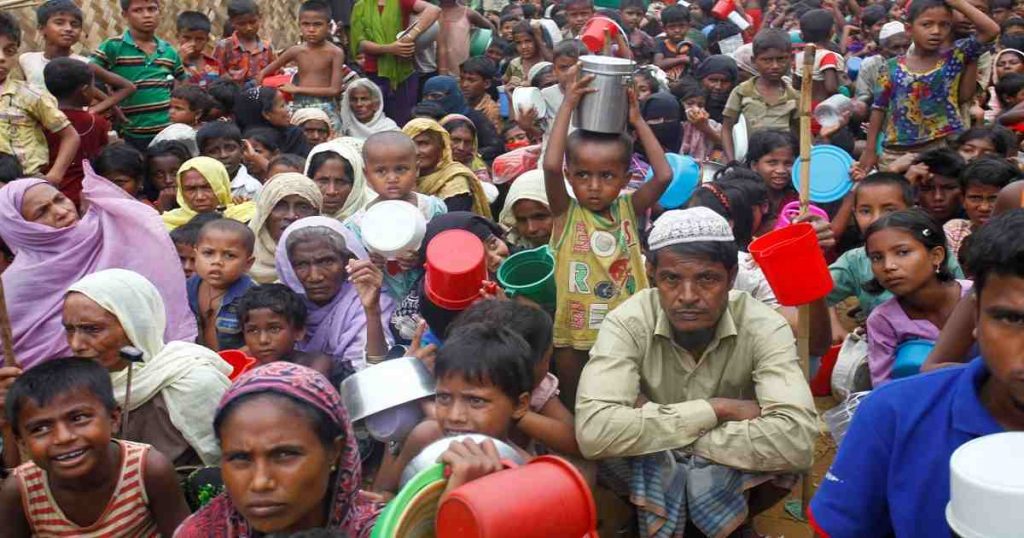Refugees International a Washington-based voluntary organization working for the welfare of refugees has urged the Bangladesh government to ensure equitable access to COVID vaccines for Rohingya refugees, and improve community outreach efforts to build trust and counter misinformation. In a report titled ‘Fading humanitarianism: The dangerous trajectory of the Rohingya Response in Bangladesh’ Refugees International urged the government to remove barbed wire fencing from around the camps that makes it more difficult for refugees to access services and hinders escape from and response to an increasing number of fires in the camps.
The report urges UN agencies, member states, donors, and NGOs To maintain and expand pressure on the Myanmar military to end attacks on civilians and return to a path to democracy that respects the rights of ethnic minority groups including the Rohingya. Such pressure should include expanded targeted sanctions, a global arms embargo, and concerted diplomatic efforts. The United States should appoint a high-level Presidential Envoy on Myanmar to coordinate U.S. multilateral efforts.
Prepare a regional humanitarian response to likely increased displacement and humanitarian needs because of deteriorating conditions in Myanmar, it says.
The report says, the coup and deteriorating conditions in Myanmar will rightfully remain the focus of international attention on the region. But this does not mean that the dangerous trajectory of Bangladeshi policies toward Rohingya refugees can be ignored.
Indeed, the tragedy in Myanmar and threat of further displacement and human suffering underscore the importance of Myanmar’s neighbours showing solidarity and compassion to those who have fled the Myanmar military’s abuses. Bangladesh has been at the forefront of providing refuge. With the support and encouragement of international donors and humanitarian actors, it can and must maintain that welcome and turn back from the dangerous trajectory toward which it is currently heading, the report says.
The recommendations made in the report include: ‘Expand investigations into the causes of fires in the camps and publicly release the results, including in the Rohingya language.
‘Refrain from moving refugees to Bhasan Char until independent UN assessments can confirm the safety and feasibility of hosting refugees on the island and until adequate steps are taken to inform refugees and ensure any moves are voluntary. Refugees currently on the island should be allowed to return to the main camps if they choose. Allow access for independent human rights organizations and media to Bhasan Char.
‘Update and clarify the national strategy on the Rohingya, including clear lines of reporting and responsibility and streamlining of NGO project approvals and visa processes to allow a more efficient and informed response. Ensure consultation and inclusion of UN, NGO, and refugee representatives in the development of new policies affecting refugees and the humanitarian response. Revise governance structures within the camps, including clarification of the mandates of Camps-in-Charge (CiCs) and addressing corruption and overreach.
‘Include protection services such as GBV response and prevention, child protection, and psycho-social support among the essential services that are continued under COVID-related restrictions. Lift COVID-related restrictions on humanitarian presence and services in the camps as soon as safely possible, and ensure that any restrictions are carefully weighed against the negative impact of the loss of key services.
‘Expand education and livelihood opportunities. Restart and expand the pilot education program agreed to in 2020 to include accreditation and access to higher learning. Expand volunteer cash-for-work programs that provide a vital lifeline for refugees. Allow formal livelihoods programming and opportunities for refugees to work.
‘Refrain from repatriating Rohingya refugees to Myanmar until conditions are safe and a legitimate government has taken meaningful and verifiable steps to address ongoing human rights abuses, restrictions on movement and humanitarian access, and denial of citizenship and fundamental rights to the Rohingya.
‘Allow third party resettlement of Rohingya refugees starting with particularly vulnerable cases and family reunifications.’
Source: https://www.refugeesinternational.org/reports/2021/5/24/fading-humanitarianism-the-dangerous-trajectory-of-the-rohingya-refugee-response-in-bangladesh




